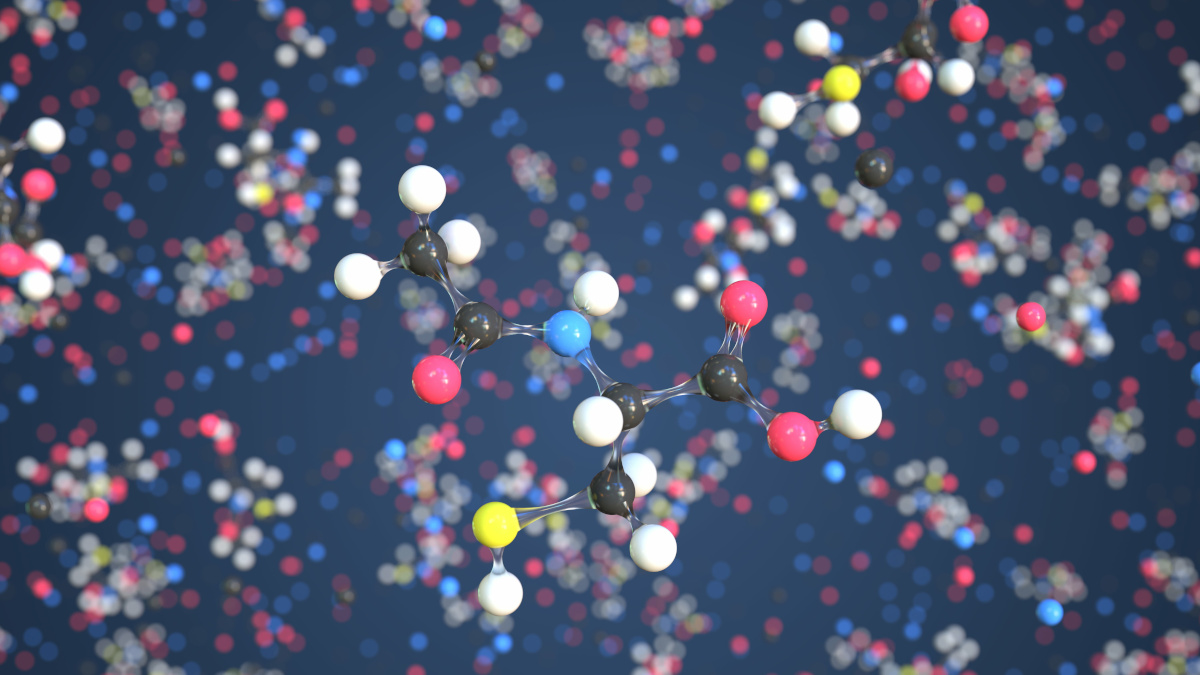N-acetylcysteine: what benefits does it offer? What is its link with glutathione?
N-acetylcysteine (NAC) supplements have enjoyed consistent success in recent times. What’s behind this continuing popularity? And what’s the relationship between NAC and glutathione?

What is N-acetylcysteine?
N-acetylcysteine (or NAC) is an amino acid which comes from L-cysteine, one of the 11 non-essential amino acids which form the building blocks of our proteins (1). It is not found in its natural state in either the body or the diet.
Available to the public in the form of dietary supplements for the past few decades, this molecule, discovered in 1899, was studied extensively in the 1990s, particularly in the fields of pulmonology, immunology and neurology (2). It also features in the World Health Organization’s list of essential medicines.
How does NAC act in the body?
N-acetylcysteine’s strength lies in its versatility: it has an amazing ability to act at various levels in the body, primarily exerting a protective action.
A special connection with the respiratory system
Researchers have highlighted its specific affinity with the pulmonary and bronchial pathways (3). Combined with appropriate medication, NAC offers promising prospects for reducing the intensity and severity of pain and discomfort (4).
Rare access to the nervous system
N-acetylcysteine has another feature of particular interest to the scientific community: its ability to cross the blood-brain barrier (5). This physical and metabolic filter is designed to isolate the central nervous system from the circulation (and the potentially toxic molecules it transports).
NAC is thus able to access the brain directly, a rarety among synthetic substances, raising considerable hope for problems related to nerve tissue (6-8).
A cellular bodyguard
Studies are attempting to clarify how NAC interacts with our immune systems, particularly with certain interleukins (IL-6, IL-8…) as well as with the expression of nuclear factor kappa B, involved in inflammatory processes and cell proliferation (9-10).
A favorite with women
N-acetylcysteine also appears to provide valuable support to menopausal women, in whom there’s an inevitable decline in estrogen levels (11). And as we know, this change predisposes to, amongst others, urinary and vaginal imbalances.
Another subject under investigation is its potential benefits in male and female infertility (12-14).
N-acetylcysteine and glutathione: what’s the connection?
Another key reason why NAC has gained so much attention is that it is the most direct precursor of glutathione, a tripeptide composed of cysteine, glycine and glutamic acid (15). By enabling the production of cysteine, N-acetylcysteine thus has a direct effect on the body’s glutathione levels (16).
Present in almost all cells of living organisms, glutathione acts as a strong defensive shield. In particular, it ensures that redox potential is maintained within cytoplasm (17).
Primarily stored in the liver, it also ensures important detoxification functions (18). Several studies have examined its role in the metabolism and elimination of potentially harmful compounds such as drugs or cigarette smoke (19-20). In fact, NAC has long been used in conventional medicine in cases of paracetamol (acetaminophen) poisoning (21).
We often see a decline in glutathione levels with aging, as well as with many forms of neurological, respiratory and metabolic dysfunction (22-23).
NAC (and glutathione) supplements to opt for
Its synthetic nature means that it is unfortunately impossible to boost your NAC intake naturally – by, for example, modifying your diet or lifestyle. Supplementation with N-acetylcysteine is therefore necessary in order to fully benefit from its properties (with the supplement N-Acetyl Cysteine, for example, the daily dose is divided into 3 capsules for greater flexibility and an optimal spread across the day) (24).
Another possibility is a direct intake of glutathione. The problem here is that it is rapidly broken down by enzymes in the gut called gamma-glutamyltranspeptidases, thus minimising its absorption (25).
To get round this problem, you can opt for:
- a perlingual form (such as the suckable tablets Perlingual Glutathione) (26) ;
- glutathione in its reduced form, at a high enough dose (such as Reduced Glutathione, containing 500mg of reduced glutathione per capsule) (27) ;
- reduced glutathione in an acetylated form (try the powerful S-Acetyl Glutathione) for unbeatable bioavailability (28).
To reduce the effects of oxidative stress on our cells, glutathione is combined in some formulations with recognized antioxidants such as turmeric and grapeseed (the high-performance supplement AntiOxidant Synergy is one such example, delivering a variety of well-known compounds such as green tea, resveratrol and pine bark) (29-30).
References
- Šalamon Š, Kramar B, Marolt TP, Poljšak B, Milisav I. Medical and Dietary Uses of N-Acetylcysteine. Antioxidants (Basel). 2019 Apr 28;8(5):111. doi: 10.3390/antiox8050111. PMID: 31035402; PMCID: PMC6562654.
- Ershad M, Naji A, Vearrier D. N Acetylcysteine. [Updated 2022 May 1]. In: StatPearls [Internet]. Treasure Island (FL): StatPearls Publishing; 2022 Jan-. Available from: https://www.ncbi.nlm.nih.gov/books/NBK537183/
- Dekhuijzen PN, van Beurden WJ. The role for N-acetylcysteine in the management of COPD. Int J Chron Obstruct Pulmon Dis. 2006;1(2):99-106. doi: 10.2147/copd.2006.1.2.99. PMID: 18046886; PMCID: PMC2706612.
- Sadowska AM, Verbraecken J, Darquennes K, De Backer WA. Role of N-acetylcysteine in the management of COPD. Int J Chron Obstruct Pulmon Dis. 2006;1(4):425-34. doi: 10.2147/copd.2006.1.4.425. PMID: 18044098; PMCID: PMC2707813.
- Tardiolo G, Bramanti P, Mazzon E. Overview on the Effects of N-Acetylcysteine in Neurodegenerative Diseases. 2018 Dec 13;23(12):3305. doi: 10.3390/molecules23123305. PMID: 30551603; PMCID: PMC6320789.
- Bernhardt LK, Bairy KL, Madhyastha S. Neuroprotective Role of N-acetylcysteine against Learning Deficits and Altered Brain Neurotransmitters in Rat Pups Subjected to Prenatal Stress. Brain Sci. 2018 Jun 28;8(7):120. doi: 10.3390/brainsci8070120. PMID: 29958412; PMCID: PMC6071106.
- Monti DA, Zabrecky G, Kremens D, Liang TW, Wintering NA, Bazzan AJ, Zhong L, Bowens BK, Chervoneva I, Intenzo C, Newberg AB. N-Acetyl Cysteine Is Associated With Dopaminergic Improvement in Parkinson's Disease. Clin Pharmacol Ther. 2019 Oct;106(4):884-890. doi: 10.1002/cpt.1548. Epub 2019 Jul 17. PMID: 31206613.
- Bavarsad Shahripour R, Harrigan MR, Alexandrov AV. N-acetylcysteine (NAC) in neurological disorders: mechanisms of action and therapeutic opportunities. Brain Behav. 2014 Mar;4(2):108-22. doi: 10.1002/brb3.208. Epub 2014 Jan 13. PMID: 24683506; PMCID: PMC3967529.
- Paterson RL, Galley HF, Webster NR. The effect of N-acetylcysteine on nuclear factor-kappa B activation, interleukin-6, interleukin-8, and intercellular adhesion molecule-1 expression in patients with sepsis. Crit Care Med. 2003 Nov;31(11):2574-8. doi: 10.1097/01.CCM.0000089945.69588.18. PMID: 14605526.
- Kwon Y. Possible Beneficial Effects of N-Acetylcysteine for Treatment of Triple-Negative Breast Cancer. Antioxidants (Basel). 2021 Jan 24;10(2):169. doi: 10.3390/antiox10020169. PMID: 33498875; PMCID: PMC7911701.
- Arranz L, Fernández C, Rodríguez A, Ribera JM, De la Fuente M. The glutathione precursor N-acetylcysteine improves immune function in postmenopausal women. Free Radic Biol Med. 2008 Nov 1;45(9):1252-62. doi: 10.1016/j.freeradbiomed.2008.07.014. Epub 2008 Jul 27. PMID: 18694818.
- Devi N, Boya C, Chhabra M, Bansal D. N-acetyl-cysteine as adjuvant therapy in female infertility: a systematic review and meta-analysis. J Basic Clin Physiol Pharmacol. 2020 Nov 19;32(5):899-910. doi: 10.1515/jbcpp-2020-0107. PMID: 34592079.
- Jannatifar R, Parivar K, Roodbari NH, Nasr-Esfahani MH. Effects of N-acetyl-cysteine supplementation on sperm quality, chromatin integrity and level of oxidative stress in infertile men. Reprod Biol Endocrinol. 2019 Feb 16;17(1):24. doi: 10.1186/s12958-019-0468-9. PMID: 30771790; PMCID: PMC6377938.
- Thakker D, Raval A, Patel I, Walia R. N-acetylcysteine for polycystic ovary syndrome: a systematic review and meta-analysis of randomized controlled clinical trials. Obstet Gynecol Int. 2015;2015:817849. doi: 10.1155/2015/817849. Epub 2015 Jan 8. PMID: 25653680; PMCID: PMC4306416.
- Forman HJ, Zhang H, Rinna A. Glutathione: overview of its protective roles, measurement, and biosynthesis. Mol Aspects Med. 2009 Feb-Apr;30(1-2):1-12. doi: 10.1016/j.mam.2008.08.006. Epub 2008 Aug 30. PMID: 18796312; PMCID: PMC2696075.
- Mokhtari V, Afsharian P, Shahhoseini M, Kalantar SM, Moini A. A Review on Various Uses of N-Acetyl Cysteine. Cell J. 2017 Apr-Jun;19(1):11-17. doi: 10.22074/cellj.2016.4872. Epub 2016 Dec 21. PMID: 28367412; PMCID: PMC5241507.
- Kerksick C, Willoughby D. The antioxidant role of glutathione and N-acetyl-cysteine supplements and exercise-induced oxidative stress. J Int Soc Sports Nutr. 2005 Dec 9;2(2):38-44. doi: 10.1186/1550-2783-2-2-38. PMID: 18500954; PMCID: PMC2129149.
- Ketterer B, Coles B, Meyer DJ. The role of glutathione in detoxication. Environ Health Perspect. 1983 Mar;49:59-69. doi: 10.1289/ehp.834959. PMID: 6339228; PMCID: PMC1569131.
- Shen H, Kauvar L, Tew KD. Importance of glutathione and associated enzymes in drug response. Oncol Res. 1997;9(6-7):295-302. PMID: 9406235.
- Shen H, Kauvar L, Tew KD. Importance of glutathione and associated enzymes in drug response. Oncol Res. 1997;9(6-7):295-302. PMID: 9406235.
- Ben-Shachar R, Chen Y, Luo S, Hartman C, Reed M, Nijhout HF. The biochemistry of acetaminophen hepatotoxicity and rescue: a mathematical model. Theor Biol Med Model. 2012 Dec 19;9:55. doi: 10.1186/1742-4682-9-55. PMID: 23249634; PMCID: PMC3576299.
- Zhu Y, Carvey PM, Ling Z. Age-related changes in glutathione and glutathione-related enzymes in rat brain. Brain Res. 2006 May 23;1090(1):35-44. doi: 10.1016/j.brainres.2006.03.063. Epub 2006 May 2. PMID: 16647047; PMCID: PMC1868496.
- Townsend DM, Tew KD, Tapiero H. The importance of glutathione in human disease. Biomed Pharmacother. 2003 May-Jun;57(3-4):145-55. doi: 10.1016/s0753-3322(03)00043-x. PMID: 12818476; PMCID: PMC6522248.
- Tenório MCDS, Graciliano NG, Moura FA, Oliveira ACM, Goulart MOF. N-Acetylcysteine (NAC): Impacts on Human Health. Antioxidants (Basel). 2021 Jun 16;10(6):967. doi: 10.3390/antiox10060967. PMID: 34208683; PMCID: PMC8234027.
- Hanigan MH. gamma-Glutamyl transpeptidase, a glutathionase: its expression and function in carcinogenesis. Chem Biol Interact. 1998 Apr 24;111-112:333-42. doi: 10.1016/s0009-2797(97)00170-1. PMID: 9679564.
- Schmitt B, Vicenzi M, Garrel C, Denis FM. Effects of N-acetylcysteine, oral glutathione (GSH) and a novel sublingual form of GSH on oxidative stress markers: A comparative crossover study. Redox Biol. 2015 Dec;6:198-205. doi: 10.1016/j.redox.2015.07.012. Epub 2015 Jul 29. PMID: 26262996; PMCID: PMC4536296.
- Chatterjee A. Reduced glutathione: a radioprotector or a modulator of DNA-repair activity? 2013 Feb 7;5(2):525-42. doi: 10.3390/nu5020525. PMID: 23434907; PMCID: PMC3635210.
- Locigno R, Pincemail J, Henno A, Treusch G, Castronovo V. S-acetyl-glutathione selectively induces apoptosis in human lymphoma cells through a GSH-independent mechanism. Int J Oncol. 2002 Jan;20(1):69-75. PMID: 11743644.
- Biswas SK, McClure D, Jimenez LA, Megson IL, Rahman I. Curcumin induces glutathione biosynthesis and inhibits NF-kappaB activation and interleukin-8 release in alveolar epithelial cells: mechanism of free radical scavenging activity. Antioxid Redox Signal. 2005 Jan-Feb;7(1-2):32-41. doi: 10.1089/ars.2005.7.32. PMID: 15650394.
- Gupta M, Dey S, Marbaniang D, Pal P, Ray S, Mazumder B. Grape seed extract: having a potential health benefits. J Food Sci Technol. 2020 Apr;57(4):1205-1215. doi: 10.1007/s13197-019-04113-w. Epub 2019 Sep 30. PMID: 32180617; PMCID: PMC7054588.
Keywords
20 Hours
great products and prices
great products and prices
Marie
6 Days
Easy to navigate site
Easy to navigate site, had what I was searching for, good price. easy order-check out
James Tucker
12 Days
My skin is clearing up nicely!
Pretty good for my skin so far.
Christian
14 Days
The new packaging is excellent
The new packaging is excellent - finally! No more squashed boxes and torn envelopes.
GORAN
15 Days
Great Product
Great Product
Larry Garrett
20 Days
Quick shipping
Quick shipping; good price. No issues!
Mary McCarty
21 Days
Thr product is very good and is helping…
Thr product is very good and is helping me on my health. Then is always on time
LUGO Luz
24 Days
Buying was fine
Buying was fine. I had problems with the website not recognizing my login info, and had to call to get it fixed. Other than that, everything was good.
David S. Clark
24 Days
Your super maca and super ginseng are…phenomenal
Your super maca and super ginseng are phenomenal supplements that compliment each other when taking them together. Fantastic feeling of well-being and lots of mid day energy without the crash.
Keith Mason
27 Days
I have had amazing results with every…
I have had amazing results with every supplement I've purchased. I am extremely satisfied with this company
kirstin Torres
27 Days
Fine products
Fine products . They are on the leading edge of online supplements. The only issue -so far-is they sometime run out of subscription items.
Jason Argos
29 Days
The ordering process is very user…
The ordering process is very user friendly and the products always come in a timely manner.
CARTER Rhonda
31 Days
The price for Dr
The price for Dr. Pero's AC-11 is reasonable and in line with his views. (my former colleague). Keep it pure.
CAMPBELL Clayton
33 Days
Right on every time.
Right on every time.
Arthur Nicholas
36 Days
They are cheaper than everyone else and…
They are cheaper than everyone else and the shipping was fast. Great company.
Patricia Adams




